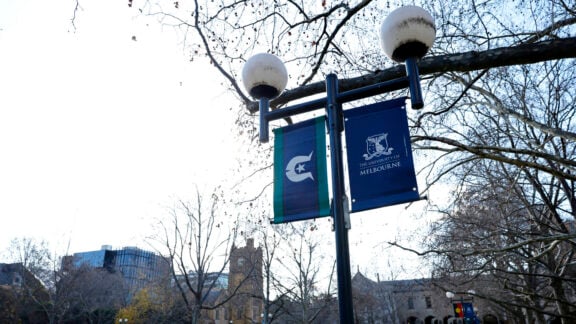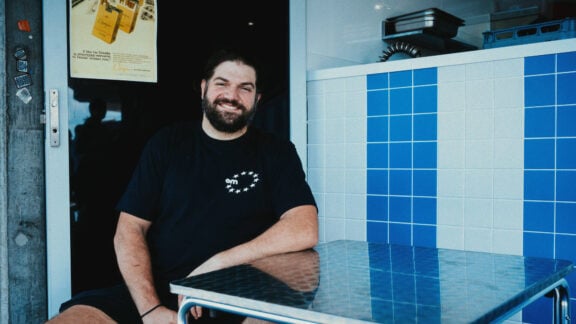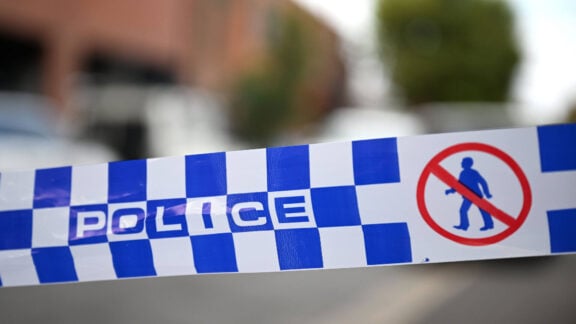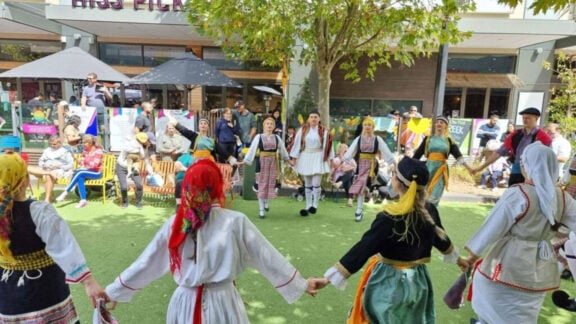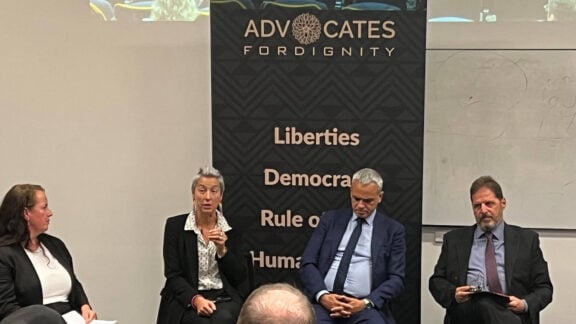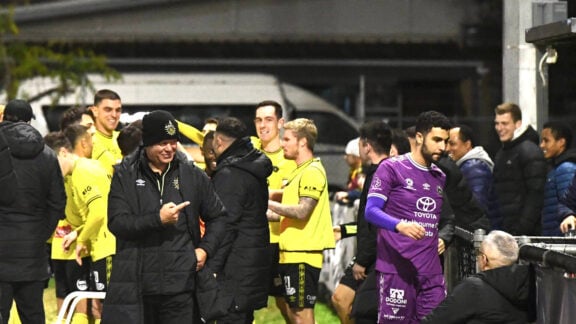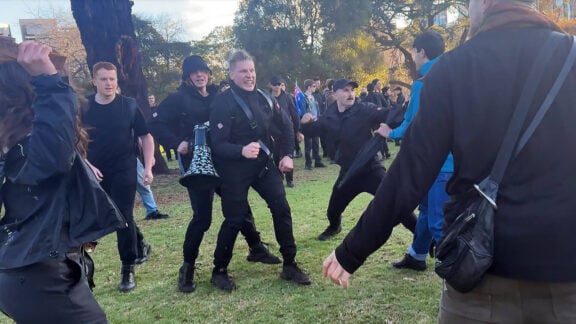Greek historian Herodotus wrote that being Greek was not about geography but a state of mind – Hellenism built on shared language, food, culture and gods. Greek migrants spread around the world and for almost 3,000 years, their culture and traditions have flourished in colonies from Africa to France and finally in Australia. In more recent times they also brought a rich football tradition to wherever they made home.
“The story of South Melbourne Hellas Football Club is the story of the Greeks in Australia,” says Petros Kosmopoulos, author of The History of South Melbourne Hellas FC.
“To grow from a merger of small Greek clubs to winning Oceania Club of the Century mirrors the Greek Australian journey. A small, fragmented community of single, homesick men working as unskilled labourers has evolved to a global success story.”
There are 52 players who have represented both South Melbourne Hellas and the Socceroos including Ange Postecoglou, the current national team coach and freshly minted AFC coach of the year. The Postecoglou family came off the migrant ship Patris, as did another Hellenic hero, Ulysses Kokkinos. In the 1960s and ’70s Hellas had the biggest football crowds in Australia and they screamed loudest for Kokkinos, a silky, enigmatic striker and Australian football’s first playboy.
“I’ll never forget standing amongst the Hellas fans with my father,” says Ralph Barba, SEN Radio football analyst. He remembers a big crowd of 15,000 and old Greek men smelling like whisky muttering “Ulysses, Ulysses, Ulysses”. The crowd rose out of their seats and screamed when he got the ball. “I’ve watched thousands of games in Australia and nobody, not Kewell or Cahill or Viduka, got more adulation than Ulysses,” says Barba.
Ulysses Kokkinos was born in 1949 in the Greek section of Istanbul, Turkey, the son of a conservative timber merchant father Yannis, and mother Vasiliki.
For a man who craved stability it seems a strange move for Yannis to prophetically name his son Ulysses, after Homer’s wandering, promiscuous hero of the ancient epic The Odyssey. In a case of life imitating myth, both men were displaced and distracted by wine, drugs, women and song before making the long journey home to a forgiving family.
Now 66, Kokkinos looks fit and holds court in a packed restaurant in Oakleigh, the Greek capital of Melbourne. “Nobody taught me football in Istanbul,” he says with a smile. “I didn’t get trains or toys, just a ball. If not I would create one out of wrapping paper. I was born with football.”
News of his prowess reached Fenerbahçe legend and Turkey captain Lefteris Kucukandoniadis, also of Greek heritage, and Kokkinos was surprised to see Lefteris one night asking to see his father. His father was against a career in football, insisting “he’s just a kid” and that university and the family business were the priority. Kokkinos remembers Lefteris replying that “he’s a different kid” and his father relenting, allowing him to join Pera and play at the famous Mithatpasa Stadium.
In 1964 tension between Greece and Turkey reached breaking point and at 15 his world turned upside-down when the Kokkinos family, along with other Greek nationals, were forced to flee Istanbul on specially commandeered Olympic Airlines flights. Their shop was locked, their bank accounts frozen and they arrived in Athens with five suitcases. Kokkinos remembers his father’s hair “turning white”.
Kokkinos’ talents were immediately recognised by Proodeftiki FC, the Greek second division champions, and he signed his first contract. He never felt at home in Athens and his father spoke of moving to Canada or Australia where Kokkinos had heard players earned good money.
Restless and without any real friends, Kokkinos “wanted to see something new” and set out for Piraeus, the port of Athens. He purchased a ticket to tour the Patris, one of the main ships carrying migrants to Australia. He hid downstairs in the workers’ cabins, a 16-year-old without a passport or change of clothes, leaving his family and football club behind him. By the time the workers discovered him it was too late and they adopted him. The Patris arrived in Fremantle and Kokkinos snuck off the ship with an address where some kindly Greeks gave him a change of clothes and a train ticket to Melbourne.
Three days later Kokkinos arrived at Spencer Street station, illegal, hungry and without a plan. He sat at Kypseli restaurant in Lonsdale Street for most of the day, and his only consolation was chicken soup. “Like my mother’s!” he remembers.
“I believe in guardian angels because I had mine,” says Kokkinos. Soula, a priest’s daughter, took pity on young Ulysses, renting a room for him in Carlton, cooking for him and buying him new clothes. “We’re still friends on Facebook,” Kokkinos says with a smile.
Nick Kitsakis, a football journalist for Greek Australian newspapers The Torch and Athletic Echo and a long-time friend of Kokkinos, remembers his arrival in Carlton, where he was also staying. Kitsakis recalls “a quiet, church-going boy who was obsessed with football”.
He went straight to South Melbourne Hellas training and within 20 minutes a circle of fans had gathered to watch him juggle the ball. Kokkinos was signed by South Melbourne as a junior and spent 1966 training with the team, coming off the bench for a few games to play with some Greek national team heroes, none greater than AEK Athens and Greek national team star Kostas Nestoridis, who was top scorer in Greece’s Division 1 from 1959-1963. Nestoridis was captain-coach of the 1966 South Melbourne state champions, scoring 22 goals in 18 games, and at the end of the season returned to Greece to see his family. He was replaced by a caretaker coach, former Stoke City player John Anderson, who gave Kokkinos his break. He was selected for the 1967 Ampol Cup, and the 18-year-old repaid the faith with two goals in front of 23,000 fans. The headline in The Torch announced: ‘A new star is born in Victorian soccer.’ Nestoridis returned to Australia and confronted Kokkinos at training, ordering him to cut his long, afro hairstyle. Kokkinos refused. “I always wanted long hair and my father cut it,” he explains. He turned up to the next game against Melbourne Hungaria at Middle Park with his hair untouched and was ordered to the stands by a furious Nestoridis. Hellas were kept scoreless in the first half and at half-time a loudspeaker announcement called Kokkinos to the Hellas dressing room. Awaiting him was a barber and chair. “When he ran out for the second half, he was shorn like a sheep but he scored two goals and Hellas won,” Kitsakis says.
“When Kokki scored and at the end of the game, teenage girls would run onto the field and fight off the young boys to hug him. Nobody has ever done that, not even George Best.”
Kokkinos was admired by both teammates and opponents. Former England and Manchester United youth player and teammate Ernie Ackerley said: “He could do anything, was unselfish and the big crowds loved him. When he scored he was the king.” Opponent Keith Adams from Ringwood Wilhelmina also has fond memories: “Kokki was the shining light of our game in those wonderful days – the man who stood out on and off the park.”
For the Greek migrants, people of strong passions working long hours in factories, he was their entertainer. Told to assimilate and dilute their ‘Greekness’, Kokkinos provided a stunning alternative. Men and their sons would gather at the ground in their suits after church on Sunday and point at Kokkinos: “Now that’s a Greek!”
In late 1967 Nestoridis returned to Greece and was replaced with Lou Brocic, the former coach of Juventus and Barcelona. Brocic told The Torch: “When I was with Juventus I handled the bad boy of European soccer, Omar Sivori, but I can’t handle Kokki, he’s not listening.”
Kokkinos disagrees. “Believe it or not, no coach told me what to do, just look out for certain players. I was free!”
1968 marked the first time he went to a disco – Silvers in Toorak. “It all changed from that night,” Kokkinos says. A natural on the dance floor, he had grown his hair long again and took to the Age of Aquarius with a flourish. Back in Greece, a military junta had staged a coup banning all western influences including jeans, rock music and long hair. Kokkinos was the antithesis of this new stifling Greek government – a rock-star footballer who made his own rules.
A year later, Nestoridis invited Kokkinos to Greece and he signed with the powerhouse Panathinaikos. His start was delayed by his first club Proodeftiki, which tried to enforce its original contract. Former Hellas teammate Michael Mandalis was in Greece at the time and recalls: “Kokki was a big deal and on the front page. They talked a lot about his speed.”
Kokkinos was picked to tour America with Panathinaikos and play in a tournament that included Inter Milan. Kokkinos fondly remembers: “I got three headers on Giacinto Facchetti, the Italian legend. I felt invincible.”
His performance was not missed by some Greek American women who invited him to a party. Violating a curfew, Kokkinos snuck out with goalkeeper Vasilis Konstantinou, but on their return at 5.30 am, coach Laki Petropoulos was waiting in their room and said: “Good morning beautiful boys, I hope you enjoyed your night. Don’t change your clothes, you are going back to Greece.”
Kokkinos never recovered from that scandal and had numerous run-ins with team captain Mimis Domazos. In 1971, Panathinaikos were coached by the great Hungarian Ferenc Puskas and due to play Ajax at Wembley in the upcoming European Cup final.
Puskas had previously selected Kokkinos at left-back but after a few trials he refused to play there, feeling insulted as a career striker. He told Puskas and the chairman, a general in the army, that he was returning to Australia.
Kokkinos remembers heated scenes and goalkeeper Vasilis Konstantinou pleading with him: “Do you know where you are, you silly Turk? You come from nowhere, malaka, live every Greek boy’s dream.” Kokkinos replied: “I would rather score goals for South Melbourne Hellas.”
His confused father begged him to “stay in one place” but Kokkinos didn’t budge, saying: “I was young, stupid and stubborn. I only play striker.”
Kokkinos was earning more in Australia and Hellas crowds were bigger than most Greek clubs. Kokkinos says: “The whole time my mind was with Hellas. So much love from one people. You are married to it.”
Ex-South Melbourne and Socceroos star Kimon Taliadoros said playing at Middle Park was like “riding a wave of emotion”. Former player Mike Mandalis likened the crowd to a “volcanic eruption”. Mandalis played with Kokkinos for two years. “He was a gifted freak who could dribble, was unbeatable in the air and an opportunist who would always add something original from his character to the game. He was one of the best to come to our country.”
Panathinaikos lost 2-0 to Ajax in the European Cup final and upon Kokkinos’ return to Melbourne, negotiations with South Melbourne soured. His contract was split into payments. Kokkinos told them, “I’m not lay-by” and left to play for crosstown rival Greek side Fitzroy Alexander, stunning the Hellas fans, but he returned the next year, forgiven like the prodigal son. Kokkinos says: “I was a professional and had to be paid.” In the days before player agents, he instinctively knew that footballers had to cash in their chips before they were taken away.
Comedian Chris Rock once observed that a man is as faithful as his options and Ulysses had plenty. His love life was covered by the media and as early as 1968 leading writer Fred Villiers wrote in Soccer World that Kokkinos was “the new George Best”, after the legendary Northern Irish football playboy.
Football was on Channel Nine in Melbourne and Kokkinos was a crossover star, embracing the playboy persona, with one media stunt having him lying on a double bed in Middle Park flanked by supermodels. Kokkinos took a revolutionary path and made mainstream headlines for stating that he always had sex before a game and it had a positive effect. Today, Kokkinos shrugs his shoulders and says: “A beautiful dinner, glass of wine and making love. I would be flying the next day.Television paid big money for me to say it!”
Kokkinos returned to Greece to play with Division 1 team Panserraikos FC, scoring two goals in the final game to save them from relegation. He then took his show on the road, a travelling football troubadour playing for different clubs including Melbourne Juventus and Sydney Hakoah and another stint in Greece with Paniliakos FC.
In 1974 Kokkinos returned to South Melbourne for the fourth time and won his first state title. South Melbourne Hellas historian John Kyrou’s records show Kokkinos scored 33 goals in 75 games for the club. Kitsakis says Kokkinos played for 10 different clubs and received 14 transfer payments over a 16-year career.
According to the statistician, John Punshon, Kokkinos played for Victoria five times, scoring twice including a spectacular scissor kick goal against Japanese touring side Toyo Kogyo. In an interview in the Athletic Echo, Victorian coach Tony Boggi said: “Kokkinos will play a magical 20 minutes and win the game. That’s why I select him.”
All through lunch, a procession of Greeks of all ages approach Kokkinos to pay their respects. Mature women giggle and point as they walk past. Love is in the air as old men rise up as Ulysses greets them, hands waving with joy punctuated by long pauses – a silent freemasonry of things shared.
Kokkinos gets out of his seat to hug Philip Diamataris, an FFA match commissioner who offers his thoughts. “Ulysses was the first crossover star that brought the ethnic silos together. I remember going to my Uncle Jim’s, who was a South Melbourne committee member, and they were all begging Ulysses not to leave. People were crying.”
An old, white-haired man shuffles up to our table, 79-year-old Anastasios Agapitos, the founding president of the South Melbourne fan club in 1959. “Everybody loved him,” he says of Kokkinos. “Vision, dribbler, playmaker, playboy.”
Kokkinos’s flashy style stood out in Victorian football, an orchid in a bed of lettuce. By 1978 the orchid had wilted. His skills were in decline and the cone of opportunity began to narrow.
With no superannuation, player welfare managers or a trade to fall back on, Kokkinos had limited options. Too proud to ask for help, he became involved in a blackmail scandal and was sentenced to 19 months in Pentridge jail. An ex-Melbourne-Slavia goalkeeper was the warden and Kokkinos did soft time, released after six months.
Kokkinos tried for a fresh start in Perth as captain-coach for Floreat Athena. Now married, his trip west set him on a new damning course. To drinking, gambling and womanising he added a fourth vice – drugs. Every Eden has its snake and through cocaine Kokkinos found a replacement for the adrenaline of the crowd.
He went into business and had a son but his drug use grew into an addiction, leading to divorce and depression. He moved to Queensland but trouble followed him and he served two more jail terms in Melbourne for cocaine offences. Kokkinos finally had his dark night of the soul when his father visited him in jail and broke down crying. Kokkinos had never seen his father shed a tear and will never forget the moment. “It struck me cold and broke my heart – I had dishonoured my family name. My soccer success meant nothing.” After being released from prison he found peace and reconciled with his father, who, having forgiven his son, returned to Greece and passed away in 2001.
Kitsakis explains the fall. “His whole career he talked and laughed with everybody,” he says. The list included kids, homeless drunks, politicians and women, who Kitsakis says would do everything for him. Kokkinos repaid them all with beautiful football but nothing could prepare him for fame. Kitsakis says his house is always open to him. “Drugs destroyed him as a human but like a humble, fallen angel you can’t help but love him.”
Ancient Greek philosopher Socrates argued that justice was the greatest good and a punished criminal is happier than an unpunished one. Kokkinos agrees: “I’ve learnt that if you do the crime you have to do the time. Don’t blame anybody except yourself.”
When asked if he would do things differently Kokkinos says, “I really don’t know to tell you the truth. If given the same things it could be the same.
Playing, eating, drinking, talking, fucking – with me everything extreme. God gave me a plate with everything in it – no regrets, take the good and bad.”
Kokkinos fights his demons daily but spends a lot of time with a network of former players and “my two beautiful boys”, the only family he has left. He attends most South Melbourne home games and is a club icon, inducted into their Hall of Fame in 2009. He enjoys interacting with fans and old friends: “I was honoured to play with great players and receive incredible love from the fans,” he says. “They both made me who I am.”
Where do old playboy footballers end up? In Kokkinos’ case, the quiet beach town of Mordialloc, south of Melbourne. His life is now predictable – he eats well, exercises often and has transitioned from playboy to pensioner.
The legacy of Kokkinos is more emotional than logical – a flawed genius who lived the beautiful game and made people happy. He had the talent and personality, South Melbourne Hellas provided the soil and water.
As we leave the restaurant he pauses for a final word: “My father told me ‘just be in one place’. But I wanted to be everywhere. I didn’t listen but now I am settled and every day is a gift. It doesn’t matter who loves me or not, I love them.”
* With special thanks to Peter Kalliakoudis.
